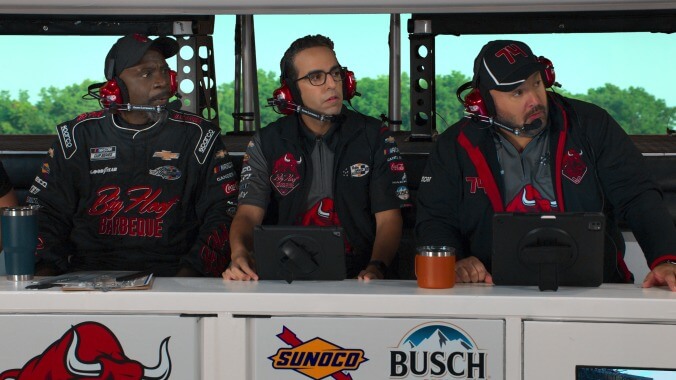Kevin James spins his wheels in the formulaic workplace comedy of The Crew


In 2021, outfitting a sitcom with a laugh track feels like a clear line in the sand. The post-Office/Arrested Development/Curb Your Enthusiasm era has seen most scripted comedies ditch the decades-old device, and the ones that haven’t are a very specific kind of show: usually aired on network television, usually more concerned with painting in broad strokes than establishing any convincing semblance of reality, and usually produced by Chuck Lorre. (Though, to be fair, Lorre eschewed his preferred medium and many of the trappings, laugh track included, that come with it when making his own move to the streaming giant in 2018.)
But the truth is, there is—and probably always will be—an enormous audience out there for comedy that’s safe, familiar, and sanitized. So while Netflix’s new original series The Crew may have done just fine in an alternate universe as a semi-realistic workplace dramedy, it could also very well find a massive following in its current incarnation as a laugh-tracked, multi-cam sitcom straight out of CBS primetime circa 1996.
The show stars Kevin James as yet another working-class guy named Kevin (surname Gibson), this time a NASCAR crew chief in the garage at the fictional Bobby Spencer Racing. After the namesake owner (Bruce McGill) retires and passes the leadership reins to his millennial daughter Catherine (Jillian Mueller) in the pilot episode, the series becomes a daily cycle of slobs versus snobs/old guard versus new guard battles as Kevin and the rest of his team struggle to come to terms with the shift.
To the credit of series creator/showrunner Jeff Lowell and director Andy Fickman (who helmed all 10 episodes of the first season), the eponymous crew all have distinct personalities without ever veering too far into crass gear-head stereotypes. There’s the pragmatic and salty Chuck (Gary Anthony Williams), his nebbish partner Amir (Dan Ahdoot), and NASCAR driver Jake (Freddie Stroma), who skates by with a charismatic mixture of vanity, boneheadedness, and youthful naïveté. Rounding out the gang is office manager Beth (Sarah Stiles), Kevin’s closest friend and confidant. The cast is charming enough, tackling their roles with an understated kind of ease rather than the exaggeration present in so many other sitcoms. Love him or hate him, James has more or less made a career at this point of playing likable schlubs (with the odd exception every now and then), and Stiles manages to find both a warmth and a bitterness in Beth, giving her character a genuine complexity.
But the characterizations aren’t enough to make up for the fact that The Crew just isn’t that funny. Yes, comedy is subjective, and yes, one’s preference for the jokes here is going to depend on how much they enjoy this particular type of sitcom—a hyper-specific genre in and of itself—to begin with. But the writers’ idea of what separates the young from the middle-aged or the working class from the corporate world feels, for lack of a better word, basic. In one episode, the crew is disgusted by Catherine restocking the break room with healthy snacks instead of junk food. Another plot point finds the team members incredulous that their long-running steak sponsor has been replaced by a company specializing in meat substitutes. There are cracks about the strangeness of any restaurant that isn’t the local bar (the predictably named Pit Stop). There are quips about Instagram. Whether or not the jokes land is irrelevant—the canned laughter stays cranked up to 11 at all times, as if attempting to drown out any dissenting opinions.
Aside from the show’s humor, so much of The Crew’s dramatic tension—what little there is—draws from the threat of unwanted change around the workplace, and that the clashing viewpoints of Kevin and Catherine will soon turn ugly. But because this is, once again, a laugh-tracked, multi-camera sitcom, there isn’t a whole lot of room for evolution. The format has always been custom-made for repetition, allowing audiences to experience the same emotional sensations week in and week out (or, in the case of Netflix, in one greedy binge).
Only in the season’s penultimate chapter is there any hint of a true groundswell in the series’ relationships and workplace dynamic. Until then, it’s episode after episode of minor crisis solved by begrudging compromise. For a show seemingly about the difficulty of change, The Crew is mostly interested in maintaining the status quo.